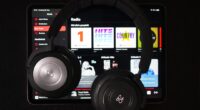Human emotions and behavior have always been profoundly influenced by music. It is capable of arousing emotions, establishing a bond, and making an impact. For this reason, the use of music in marketing is essential. The correct music can improve brand identity, boost brand recall, and eventually increase consumer engagement in advertising, events, & social media campaigns. Thanks to the music industry database, marketers can access a huge selection of music & artists in the current digital era.
Key Takeaways
- Music is a powerful tool in marketing that can help build brand identity and reach target audiences.
- The music industry database is a valuable resource for marketers looking to license music for their campaigns.
- Social media and viral marketing can be leveraged to promote music and create buzz around a brand.
- Live performances and events can be used to increase brand exposure and connect with audiences through music.
- Jingles and soundtracks can enhance advertising campaigns and create a memorable brand experience for consumers.
Finding the ideal music for a brand and its target market is made easier with the abundance of information available in this database. To discover the perfect fit for their marketing campaigns, marketers can look for particular genres, attitudes, or even artists. Also, marketers can find up-and-coming musicians & industry trends with the aid of the Music Industry Database. Marketing professionals can make sure their campaigns are engaging, relevant, and resonate with their target audience by keeping up with the most recent developments in music trends. The next step for marketers is to promote their brand to their target audience after they have selected the ideal music.
Radio, social media, and streaming services are just a few of the platforms that can be used to promote music. Knowing the target audience and their musical tastes is essential when promoting music. Marketers can produce more engaging music promotions that grab consumers’ attention by understanding what types of music appeal to them. Reaching a larger audience through collaboration with music bloggers and influencers can also be quite effective. These people have developed a devoted fan base and can aid in introducing their fans to a brand’s music, boosting awareness and interaction.
Music has the power to establish a distinctive brand identity & set it apart from rivals. Marketing professionals can arouse feelings and establish a bond with customers through the thoughtful selection of music, which fosters brand loyalty. The music selection can also aid in expressing the personality and ideals of the brand. For instance, a company wishing to project an air of adventure & excitement might select lively, upbeat music; conversely, a company trying to project an air of sophistication and elegance might opt for more instrumental or classical music. Getting the required licenses and consents from the copyright holders is crucial when using music for commercial enterprises.
| Metrics | Data |
|---|---|
| Number of attendees | 250 |
| Number of speakers | 3 |
| Duration of event | 2 hours |
| Number of sponsors | 5 |
| Number of social media mentions | 100 |
| Number of media coverage | 3 |
| Number of leads generated | 50 |
The legal and moral use of the music is guaranteed by this procedure, which is called music licensing. Marketers must take a number of things into account when selecting the ideal music for their brand. These include the music’s lyrics, tempo, and genre. The target audience should be able to relate to the music and it should be consistent with the brand’s messaging and values.
The way we listen to and distribute music has been completely transformed by social media platforms. They offer music marketers a great chance to use user-generated content and develop viral campaigns. Brands can boost engagement and brand awareness by encouraging users to use their music in original content. By being shared & circulated on social media, this user-generated content can reach a larger audience & generate buzz about the band & its music.
Direct customer interaction is another benefit of social media. By engaging with their audience, marketers can answer questions, create a community around their brand and music, & respond to messages and comments. Increased advocacy and brand loyalty may result from this direct interaction. One common strategy to generate interest in a brand and its music is through contests and giveaways.
Marketers can boost engagement & expand their reach by providing exclusive experiences or prizes. Social media platforms may be used for these promotions, encouraging users to share the brand’s music or use it to create original content. Customers become more excited and anticipatory as a result, and brand awareness rises.
Making sure that these promotions are consistent with the brand’s messaging and values is crucial. A unified & genuine music promotion that connects with the target audience can be made by marketers by adhering to the brand’s identity. A special chance for brand exposure and promotion is presented by live performances. Marketers can support music festivals and events as a way to get their brand’s music in front of a wide range of listeners. Marketers can expand their demographic reach and boost brand awareness by matching the brand’s music to the event’s theme or target demographic. Increased brand loyalty and recognition may result from this exposure.
Making sure the music is consistent with the brand’s messaging and values is extremely important. Marketers can create an unforgettable & powerful brand experience by choosing music that speaks to the attendees of the event. Advertising has long used soundtracks and jingles to establish a recognizable brand identity and boost brand recall. These brief yet memorable songs have the power to stir feelings in listeners and establish a bond, making an impression that sticks.
The messaging and values of a brand can be reinforced by marketers through the use of jingles and soundtracks in advertising campaigns. A memorable brand experience can be produced, a story can be told, and particular emotions can be evoked by the music. A brand’s values and messaging should be reflected in the jingles and soundtracks.
Marketing professionals can design a potent & successful ad campaign by choosing music that appeals to the target audience. Music will always be a vital component of advertising and marketing. New avenues for music marketing will open up as social media and streaming platforms develop further. For their campaigns to be successful, marketers must keep up with the newest developments in technology and music industry trends. Marketers can improve brand identity, boost brand recall, and eventually increase consumer engagement by utilizing the power of music.
If you’re looking for insights on marketing musical talent, you won’t want to miss this informative article on MusicPromotion.tech. In their post titled “Hello World: A Guide to Marketing Your Music,” they provide valuable tips and strategies for promoting your music effectively. Whether you’re an aspiring artist or an established musician, this article offers practical advice on building your brand, engaging with your audience, and maximizing your online presence. Check out the article here to take your music marketing game to the next level.
FAQs
What is marketing musical?
Marketing musical is the process of promoting and advertising a musical production to attract an audience and generate revenue.
What are the key elements of marketing musical?
The key elements of marketing musical include identifying the target audience, creating a marketing plan, developing promotional materials, utilizing social media and other advertising channels, and measuring the success of the marketing campaign.
What are the benefits of marketing musical?
Marketing musical can help increase ticket sales, build brand awareness, attract new audiences, and generate revenue for the production.
What are some effective marketing strategies for musical productions?
Effective marketing strategies for musical productions include utilizing social media platforms, creating engaging promotional materials, partnering with local businesses and organizations, offering discounts and promotions, and utilizing influencer marketing.
How can social media be used to market musical productions?
Social media can be used to market musical productions by creating engaging content, utilizing targeted advertising, partnering with influencers, and encouraging audience engagement and sharing.
What are some common challenges in marketing musical productions?
Common challenges in marketing musical productions include reaching the target audience, standing out in a crowded market, managing a limited budget, and measuring the success of the marketing campaign.





